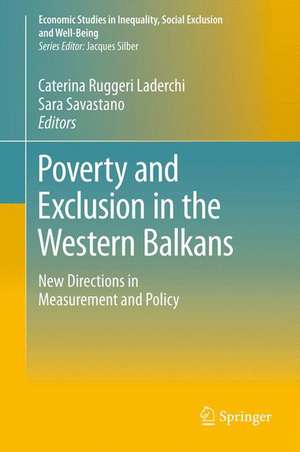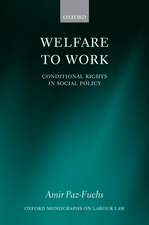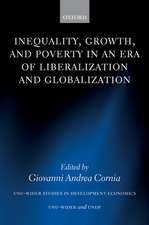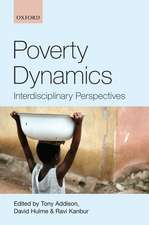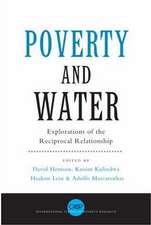Poverty and Exclusion in the Western Balkans: New Directions in Measurement and Policy: Economic Studies in Inequality, Social Exclusion and Well-Being, cartea 8
Editat de Caterina Ruggeri Laderchi, Sara Savastanoen Limba Engleză Hardback – 13 feb 2013
| Toate formatele și edițiile | Preț | Express |
|---|---|---|
| Paperback (1) | 945.14 lei 43-57 zile | |
| Springer – 6 mar 2015 | 945.14 lei 43-57 zile | |
| Hardback (1) | 949.73 lei 43-57 zile | |
| Springer – 13 feb 2013 | 949.73 lei 43-57 zile |
Din seria Economic Studies in Inequality, Social Exclusion and Well-Being
- 15%
 Preț: 649.22 lei
Preț: 649.22 lei -
 Preț: 419.06 lei
Preț: 419.06 lei -
 Preț: 386.00 lei
Preț: 386.00 lei - 15%
 Preț: 646.75 lei
Preț: 646.75 lei - 15%
 Preț: 637.46 lei
Preț: 637.46 lei - 15%
 Preț: 579.52 lei
Preț: 579.52 lei - 15%
 Preț: 634.18 lei
Preț: 634.18 lei - 15%
 Preț: 696.82 lei
Preț: 696.82 lei - 15%
 Preț: 695.19 lei
Preț: 695.19 lei - 15%
 Preț: 641.53 lei
Preț: 641.53 lei - 18%
 Preț: 1229.40 lei
Preț: 1229.40 lei -
 Preț: 367.00 lei
Preț: 367.00 lei - 15%
 Preț: 653.98 lei
Preț: 653.98 lei - 15%
 Preț: 647.73 lei
Preț: 647.73 lei - 15%
 Preț: 640.06 lei
Preț: 640.06 lei - 18%
 Preț: 950.52 lei
Preț: 950.52 lei - 15%
 Preț: 640.06 lei
Preț: 640.06 lei - 18%
 Preț: 947.50 lei
Preț: 947.50 lei - 15%
 Preț: 646.94 lei
Preț: 646.94 lei
Preț: 949.73 lei
Preț vechi: 1158.20 lei
-18% Nou
Puncte Express: 1425
Preț estimativ în valută:
181.79€ • 197.53$ • 152.80£
181.79€ • 197.53$ • 152.80£
Carte tipărită la comandă
Livrare economică 21 aprilie-05 mai
Preluare comenzi: 021 569.72.76
Specificații
ISBN-13: 9781461449447
ISBN-10: 1461449448
Pagini: 308
Ilustrații: VIII, 298 p. 73 illus., 29 illus. in color.
Dimensiuni: 155 x 235 x 22 mm
Greutate: 0.57 kg
Ediția:2013
Editura: Springer
Colecția Springer
Seria Economic Studies in Inequality, Social Exclusion and Well-Being
Locul publicării:New York, NY, United States
ISBN-10: 1461449448
Pagini: 308
Ilustrații: VIII, 298 p. 73 illus., 29 illus. in color.
Dimensiuni: 155 x 235 x 22 mm
Greutate: 0.57 kg
Ediția:2013
Editura: Springer
Colecția Springer
Seria Economic Studies in Inequality, Social Exclusion and Well-Being
Locul publicării:New York, NY, United States
Public țintă
ResearchCuprins
1. Poverty and exclusion in the Western Balkans: new directions in policy and analysis.- 2. The European context: measuring social inclusion in the European Union.- 3. Recent trends in measurement of poverty and exclusion in Western Balkans.- 4. Qualitative research to support the analysis of social inclusion in the Western Balkans.- 5. Further Updating Poverty Mapping: the case of Albania.- 6. Insights from material deprivation indicators in Bosnia Herzegovina.- 7. Measuring Social Inclusion in Serbia and in the Former Yugoslav Republic of Macedonia.- 8. Measuring Subjective Well-Being of Social Assistance Recipients in Serbia.- 9. Exclusion from formal jobs in the Western Balkans – the role of labor taxes and social benefits.- 10. Not Just Education: Gender Wage Gap in the Albanian Labor Market Through Occupational Segregation, Work Experience, and Child Care.- 11. How has internal migration in Albania affected the receipt of transfers from family and friends?.- 12. Together or Apart: Exploring Attitudes Towards Ethnic Cohabitation in Post-Independence Kosovo.- 13. Social Safety Nets in the Western Balkans: Design, Implementation and Performance.- 14. The Political Economy of Welfare Reform in the Western Balkans.- 15. Simulating distributional and poverty outcomes of the new law on social welfare in Serbia.- 16. Improving the Targeting of Social Assistance in Albania: evidence from micro-simulations.
Notă biografică
Sara Savastano is an Assistant Professor in Economics at the University of Rome Tor Vergata – Italy. In addition to her academic activities she collaborates with the Development Research Group of the World Bank, the FAO, and other international organizations and private institutions. Her research spans from option value theory and investment analysis to agricultural efficiency and productivity analysis, on which she published a number of papers, including on the Western Balkans. Recently, Sara started to explore innovative topics in Neuroeconomics and Behavioral Economics.
Caterina Ruggeri Laderchi is a Senior Poverty Economist in the Europe and Central Asia division of the World Bank. Prior to joining the World Bank she worked on poverty, employment and social issues for the Human Development Report Office of UNDP, DFID and the European Commission. Her research has mostly focused on the measurement of alternative concepts of poverty and deprivation, labour market analysis in low income settings, and the distributional and gender impacts of reforms, particularly tariff reforms.
Caterina Ruggeri Laderchi is a Senior Poverty Economist in the Europe and Central Asia division of the World Bank. Prior to joining the World Bank she worked on poverty, employment and social issues for the Human Development Report Office of UNDP, DFID and the European Commission. Her research has mostly focused on the measurement of alternative concepts of poverty and deprivation, labour market analysis in low income settings, and the distributional and gender impacts of reforms, particularly tariff reforms.
Textul de pe ultima copertă
This book maps the latest developments in the policy relevant analysis on poverty, inclusion and the social agenda in the Western Balkans. It does so by presenting a selection of recent papers which explore from a methodological and analytical point of view how the inclusion agenda can be monitored and adapted to understand the challenges in the region. The volume includes an overview and four sections, covering respectively: (1) innovations in terms of measurement of poverty and inclusion in the region (the concept of inclusion as elaborated at the EU level, innovations in survey design to suit the measurement of inclusion, methodological insights from qualitative work); (2) innovative country level analysis (updating poverty mapping in inter-censual years, the analysis of material deprivation, the analysis of determinants of social inclusion, subjective wellbeing of public work programs participants); (3) examples of country level analysis of drivers of exclusion (barriers to formalization in the labour market, gender disparities in the labour market, disruption in social networks following urbanizations, attitudes towards multi-ethnic states); (4) building inclusive safety nets (an assessment of safety nets in the region, the political economy of welfare reform, micro-simulations of social assistance reform, the adoption of better tools to improve targeting performance). The chapters combine sophisticated techniques which are at the frontiers of poverty analysis (small area estimation, efficiency analysis applied to household welfare, micro-simulations) with less ground-breaking papers which take advantage of innovative datasets or perspectives deeply grounded in the policy dialogue in the countries of the region. By providing a wide spectrum of innovative and policy relevant analytical contributions this book will be of broader interest than for observers of the region.
Caracteristici
Provides researchers the latest developments in the measurement of multi-dimensional poverty, and policy relevant analysis on countries in the Western Balkans Employs sophisticated techniques of poverty analysis such as small area estimation, efficiency analysis applied to household welfare and micro-simulations Contains unique regional focus on social and statistical issues which should be of growing interest to countries that proceed towards EU candidate status? Includes supplementary material: sn.pub/extras
